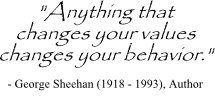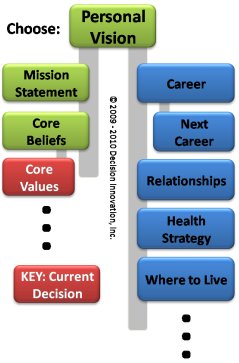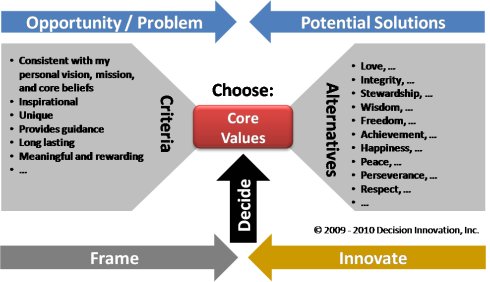Personal core values help focus and align your life choices
 Choosing your personal core values is one of the critical focusing decisions that can make an amazing difference in how you live your life. As a person, they reflect the fundamental choices of who we want to be. In our network of connected decisions, they provide the goals and criteria that should influence all our other personal decisions. We derive a sense of fulfillment when living our personal values because our motivations and actions are aligned with the aspirations of who we want to be.
Choosing your personal core values is one of the critical focusing decisions that can make an amazing difference in how you live your life. As a person, they reflect the fundamental choices of who we want to be. In our network of connected decisions, they provide the goals and criteria that should influence all our other personal decisions. We derive a sense of fulfillment when living our personal values because our motivations and actions are aligned with the aspirations of who we want to be.

What are some of the sources for my personal core values?
Do you believe in God? If you do, I would expect your core beliefs to be a significant source for the values you choose to live. Certainly, parents, teachers, friends, and coaches have a major influence on what we choose to value. Anyone we consider a credible source (good or bad) can help influence our values, and our interpretation of our own life experiences may be one of our strongest teachers. We need to recognize that our own interpretations of our life experiences may be mistaken, especially during our childhood.
Our behaviors can reveal our current core values. If you haven't made this decision, ask your family and friends what they think are your core personal values. You may be surprised at what you learn. It's possible that you aren't living the values you would intentionally choose. Making this personal choice provides the opportunity to bring your values to a conscious level and make the changes you desire to lead a fulfilled life.
Frame the criteria you will use to choose your core personal values
When choosing your personal core values it is important to think about the criteria that you will use to make your selection. Since your personal values decision will have multiple answers, your criteria will also help you to prioritize and limit your list. Using our decision making model, you will want to look at other connected decisions for goals/source requirements that will influence your criteria. If you have already made decisions for a personal vision, mission statement, and/or core beliefs, you should see goals/source requirements that will influence the criteria for this decision.
With your connected decisions in mind, here are some criteria that might help in selecting your personal core values.

- Consistent with my personal vision, mission, and core beliefs - In addition to specific goals/source requirements, you can use this criteria as a way to eliminate personal values that are inconsistent with your other decisions.
- Inspirational - Personal values should encourage you to fulfill your purpose in life. Great personal values, read every day, will provide an uplift and motivation to take on the day's challenges.
- Unique - Your values need to speak to you. Don't hesitate to use values learned from others, but your core values should help define who you are and want to be. They should reflect the priorities for your life and will tend to emphasize your strengths while compensating for your weaknesses.
- Provides guidance - Personal core values should help you in your everyday decisions, particularly with relationships.
- Long lasting - This is about creating your future. Expect that your values will evolve as you grow, mature and gain life experience. However, this is not about following the latest fad. If you expect a personal core value to change next week, it likely isn't very core.
- Meaningful and rewarding - Values provide the measures that help us live meaningful lives that fulfill our given purpose. Living a life of meaning brings us joy.
Some alternatives to consider for your personal core values
 Choosing your personal core values, unlike many other decisions, does not have a single answer. There are multiple values that help define the life we want to lead. Expect to find between five to nine values that will become more fixed as you manage your personal values development over time. When you write out your alternative values, be specific enough that you can be clear with yourself on what would or would not exemplify that value. There are many alternatives to consider and here are a few examples:
Choosing your personal core values, unlike many other decisions, does not have a single answer. There are multiple values that help define the life we want to lead. Expect to find between five to nine values that will become more fixed as you manage your personal values development over time. When you write out your alternative values, be specific enough that you can be clear with yourself on what would or would not exemplify that value. There are many alternatives to consider and here are a few examples:
- Love - that can include patience, kindness, forgiveness, trust, selflessness, compassion and protection
- Integrity - which can incorporate honesty, truthfulness, responsibility, reliability, dependability, consistency, decency, justice, sincerity and commitment
- Stewardship - resourcefulness, charity, contribution, or giving
- Wisdom - consisting of intelligence, understanding, knowledge, good judgment, insight, perception, discipline, experience, personal growth, discretion and intuition
- Freedom - or alternatively, independence, free will, liberty, autonomy, and/or self-determination
- Achievement - success, or accomplishment
- Happiness - joy, contentment, pleasure, bliss, delight, and/or gladness
- Peace - harmony, unity, tranquility, or serenity
- Perseverance - persistence, or determination
- Respect - appreciate, esteem, value, or cherish
With any option you consider, it is important to have a clear and distinct description so that you can refine and improve your personal core values based on new experiences and learning. These descriptions will also enable you to be unambiguous when you communicate your values to others.

What are the benefits of choosing my core personal values? And consequences of not choosing ...
 No person likes making mistakes. Having well defined personal core values helps us avoid making choices that work against who we want to be. Our values become a clear set of guidelines for our words and actions, consistently moving us in the direction aligned with our core beliefs and personal vision. Our life becomes one of our choosing, not one that is directed by the decisions of others. Our values help us build and maintain our identity as unique individuals.
No person likes making mistakes. Having well defined personal core values helps us avoid making choices that work against who we want to be. Our values become a clear set of guidelines for our words and actions, consistently moving us in the direction aligned with our core beliefs and personal vision. Our life becomes one of our choosing, not one that is directed by the decisions of others. Our values help us build and maintain our identity as unique individuals.
Choosing and knowing your values can provide a number of benefits that include:
- Reducing stress
- Making better decisions
- Finding environments and people that support your aspirations
- Increasing joy and happiness
- Supporting your growth and development
- Helping in times of conflict or confusion
- Growing contribution and value
- Providing motivation
Knowing it or not, choosing it or not, all of us have a set of personal core values. Prevent discontent, conflict, frustration and lack of fulfillment by choosing consciously the values by which you want to live.
Return from Personal Core Values to Personal Decision Making

